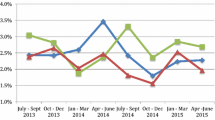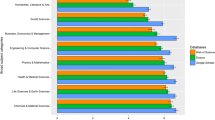Abstract
This paper compares the h-indices of a list of highly-cited Israeli researchers based on citations counts retrieved from the Web of Science, Scopus and Google Scholar respectively. In several case the results obtained through Google Scholar are considerably different from the results based on the Web of Science and Scopus. Data cleansing is discussed extensively.
Similar content being viewed by others
References
Bakkalbasi, N., Bauer, K., Glover, J., Wang, L. (2006), Three options for citation tracking: Google Scholar, Scopus and Web of Science. Biomedical Digital Libraries, 3: 7. Retrieved November 4, 2006, from http://www.bio-diglib.com/content/3/1/7
Banks, M. G. (2006), An extension of the Hirsch index: Indexing scientific topics and compounds. Scientometrics, 69(1): 161–168.
Bar-Ilan, J. (2005), Expectations versus reality — Search engine features needed for Web research at mid 2005. Cybermetrics, 9, paper 2. Retrieved November 4, 2006, from http://www.cindoc.csic.es/cybermetrics/articles/v9i1p2.html
Bar-Ilan, J. (2006), An ego-centric citation analysis of the works of Michael O. Rabin based on multiple citation indexes. Information Processing and Management, 42(6): 1553–1566.
Bar-Ilan, J. (2006b), H-index for Price medalists revisited. ISSI Newsletter, 2(1): 3–5.
Bar-Ilan, J., Levene, M., Lin, A. (2007), Some measures for comparing citation databases. Journal of Informetrics, 1(1): 26–34.
Batista, P. D., Campiteli, M. G., Kinouchi, O., Martinez, A. S. (2006), Is it possible to compare researchers with different scientific interests? Scientometrics, 68(1): 179–189.
Bauer, K., Bakkalbasi, N. (2005), An examination of citation counts in a new scholarly communication environment. D-Lib Magazine, 11(9). Retrieved February 23, 2006, from http://www.dlib.org/dlib/september05/bauer/09bauer.html
Belew, R. K. (2005), Scientific impact quality and quantity: Analysis of two sources of bibliographic data. Retrieved November 4, 2006, from http://arxiv.org/abs/cs.IR/0504036
Bornmann, L., Daniel, H. (2005), Does the h-index for ranking of scientists really work? Scientometrics, 65: 391–392.
Braun, T., Glanzel, W., Schubert, A. (2005), A Hirsch-type index for journals. The Scientist, 19(22): 8.
Braun, T., Glanzel, W., Schubert, A. (2006), A Hirsch-type index for journals. Scientometrics, 69(1): 169–173.
Burrell, Q. L. (2006), Hirsch’s h-index: a preliminary stochastic model. In: Book of Abstracts, 9th International Science & Technology Indicators Conference, Leuven, Belgium, 26–28.
Burnham J. F. (2006), Scopus database: A review. Biomedical Digital Libraries, 3(1). Retrieved November 4, 2006, from http://www.bio-diglib.com/content/3/1/1
Butler, L., McAllister, I. (2006), The Hirsch index: Is it applicable to the Social Sciences? In: Book of Abstracts, 9th International Science & Technology Indicators Conference, Leuven, Belgium, 31–32.
Costas, R., Bordons, M. (2006), H-index: Advantages, limitations and its relation with other bibliometric indicators at the micro level. In: Book of Abstracts, 9th International Science & Technology Indicators Conference, Leuven, Belgium, 189–191.
Cronin, B., Meho, L. (2006), Using the h-index to rank influential information scientists. Journal of the American Society for Information Science and Technology, 57(9): 1275–1278.
Deis, L. F., Goodman, D. (2005), Web of Science (2004 Version) and Scopus. The Charleston Advisor 6(3). Retrieved November 4, 2006, from http://www.charlestonco.com/comp.cfm?id=43
Egghe, L. (2006a), Dynamic h-index: The Hirsch Index in Function of Time. Preprint. Retrieved November 4, 2006, from http://doclib.luc.ac.be/dspace/bitstream/1942/980/1/dynamic+h.pdf
Egghe, L. (2006b), Theory and practise of the g-index. Scientometrics, 69(1): 131–152.
Egghe, L., Rousseau, R. (2006), An informetric model for the Hirsch-index. Scientometrics, 69(1): 1221–1129.
Gardner, S., Eng, S. (2005), Gaga over Google? Scholar in the Social Sciences. Library Hi-Tech News, 22(8): 42–45.
Garfield, E. (1963), Science Citation Index. Science Citation Index 1961, volume 1, v–xvi. Retrieved October 31, 2006, from http://garfield.library.upenn.edu/papers/80.pdf
Giles, J. (2005), Start your engines. Nature News, 554–555.
Glänzel, W. (2006), On the h-index — A mathematical approach to a new measure of publication activity and citation impact. Scientometrics, 67(2): 315–321.
Glänzel W., Persson, O. (2005), H-index for Price medialists. ISSI Newsletter, 1(4): 15–18.
Google Scholar (2005), Support for Scholarly Publishers. Retrieved October 31, 2006, from http://scholar.google.com/intl/en/scholar/publishers.html
Hirsch, J. E. (2005a), An index to quantify an individual’s scientific research output. Retrieved November 4, 2006, from http://arxiv.org/abs/physics/0508025
Hirsch, J. E. (2005b), An index to quantify an individual’s scientific research output. PNAS, 102(46): 16569–16572.
Iglesias, J. E., Pecharroman, C. (2006), Scaling the h-index for Different Scientific ISI Fields. Preprint. Retrieved November 4, 2006, from http://arxiv.org/ftp/physics/papers/0607/0607224.pdf
ISI HighlyCited.com (no date_a), About HighlyCited.com. Retrieved November 4, 2006, from http://hcr3.isiknowledge.com/popup.cgi?name=hccom
ISI HighlyCited.com (no date_b), How Do We Identify Highly Cited Researchers? Retrieved November 4, 2006, from http://hcr3.isiknowledge.com/isi_copy/howweidentify.htm
Jacso, P. (2004), Scopus. Peter’s Digital Reference Shelf, September 2004. Retrieved November 4, 2006, from http://www.galegroup.com/servlet/HTMLFileServlet?imprint=9999®ion=7&fileName=reference/archive/200409/scopus.html
Jacso, P. (2005a), As we may search — Comparison of major features of Web of Science, Scopus and Google Scholar citation-based and citation-enhanced databases. Current Science, 89(9): 1537–1547.
Jacso, P. (2005b), Visualizing overlap and rank differences among web-wide search engines. Online Information Review, 29(5): 554–560.
Jacso, P. (2006), Deflated, inflated and phantom citation counts. Online Information Review, 30(3): 297–309.
Kelly, C. D., Jennions, M. D. (2006), The h-index and career assessment by numbers. TRENDS in Ecology and Evolution, 21(4): 167–170.
Kousha, K., Thelwall, M. (2006a), Google Scholar Citations and Google Web/URL citations: A multidiscipline exploratory analysis. In: Proceedings International Workshop on Webometrics, Informetrics and Scientometrics & Seventh COLLNET Meeting, Nancy (France). Retrieved November 4, 2006, from http://eprints.rclis.org/archive/00006416
Kousha, K., Thelwall, M. (2006b), Sources of Google Scholar citations outside the Science Citation Index: A comparison between four science disciplines. In: Book of Abstracts, 9th International Science & Technology Indicators Conference, Leuven, Belgium, 72–73.
LaGuardia, C. (2005), E-Views and Reviews: Scopus vs. Web of Science, Library Journal, January 15, 2005.
Liang, L. (2006), H-index sequence and h-index matrix: Constructions and applications. Scientometrics, 69(1): 163–169.
Miller, C. W. (2006), Superiority of the h-index over the Impact Factor for Physics. Preprint. Retrieved November 4, 2006, from http://arxiv.org/PS_cache/physics/pdf/0608/0608183.pdf
Moed, H. F. (2005), Hirsch Index is a Creative and Appealing Construct but Be Cautious when Using It to Evaluate Individual Scholars. Retrieved November 4, 2006, from http://www.cwts.nl/hm/Comments_on_Hirsch_Index_2005_12_16.pdf
Mullen, L. B., Hartman, K. A. (2006), Google Scholar and the Library Web Site: The early response by ARL Libraries. College & Research Libraries, 67(2): 106–122.
Neuhaus, C., Neuhaus, E., Asher, A., Wrede, C. (2006), The depth and breadth of Google Scholar: An empirical study. portal: Libraries and the Academy, 6(2): 127–141.
Noruzi, A. (2005), Google Scholar: The new generation of citation indexes. LIBRI, 55(4): 170–180.
Pauly, D., Stergiou, K. I. (2005), Equivalence of results from two citation analyses: Thomson’s ISI Citation Index and Google’s Scholar service. Ethics in Science and Environmental Politics, 2005, 33–35.
Payne, D. (2004), Google Scholar welcomed. News from The Scientist, 5(1):20041123-01. Retrieved October 31, 2006, from http://www.the-scientist.com/news/20041123/01
Purvis, A. (2006), The h-index: Playing the numbers game. TRENDS in Ecology and Evolution, 21(8): 422.
Rahm, E., Thor, A. (2005), Citation analysis of database publications. SIGMOD Record, 34(4): 48–53.
Reed Elsevier (2004), Scopus Comes of Age. Retrieved October 31, 2006, from http://www.reedelsevier.com/index.cfm?Articleid=1075
Rousseau, R. (2006a), A Case Study: Evolution of JASIS’ Hirsch Index. Preprint, Retrieved November 4, 2006, from http://eprints.rclis.org/archive/00005430/01/Evolution_of_h_JASIS_rev.pdf
Rousseau, R. (2006b), Simple Models and the Corresponding h-and g-index. Preprint. Retrieved November 4, 2006, from http://eprints.rclis.org/archive/00006153/01/Rousseau_Dalian.pdf
Saad, G. (2006), Exploring the h-index at the author and journal levels using bibliometric data of productive consumer scholars and business-related journals respectively. Scientometrics, 69(1): 117–120.
Schubert, A., Glänzel, W. (2006), A systematic analysis of Hirsch-type indices for journals, preliminary results. In: Book of Abstracts, 9th International Science & Technology Indicators Conference, Leuven, Belgium, 251–253.
Scopus (no date), About Scopus. Retrieved October 31, 2006, from http://www.info.scopus.com/about
Sidiropoulos, A., Katsaros, D., Manolopoulos, Y. (2006), Generalized h-index for Disclosing Latent Facts in Citation Networks. In Proceedings of LinkKDD06. Retrieved November 4, 2006, from http://arxiv.org/PS_cache/cs/pdf/0607/0607066.pdf
Smith, A. (2006), Google Scholar as a cybermetric tool: A comparison with the New Zealand PRBF research assessment. In: Book of Abstracts, 9th International Science & Technology Indicators Conference, Leuven, Belgium, 139–141.
Thomson Scientific (no date), Web of Science. Retrieved October 31, 2006, from http://scientific.thomson.com/products/wos
van Raan, A. F. J. (2005), Comparison of the Hirsch-index with standard bibliometric indicators and with peer judgment for 147 chemistry research groups. Scientometrics, 69(1): 117–120.
Vaughan, L., Shaw, D. (2006), Comparison of citations from ISI, Google and Google Scholar: Seeking Web indicators of input. In: Book of Abstracts, 9th International Science & Technology Indicators Conference, Leuven, Belgium, 155–156.
Visser, M. S., Moed, H. F. (2005), Developing bibliometric indicators of research performance in computer science. In: Proceedings of ISSI 2005, vol. 1, 275–279.
Visser, M. S., Moed, H. F. (2006), How important are conference papers for measuring research performance in Computer Science? In: Book of Abstracts, 9th International Science & Technology Indicators Conference, Leuven, Belgium, 161–162.
Author information
Authors and Affiliations
Corresponding author
Rights and permissions
About this article
Cite this article
Bar-Ilan, J. Which h-index? — A comparison of WoS, Scopus and Google Scholar. Scientometrics 74, 257–271 (2008). https://doi.org/10.1007/s11192-008-0216-y
Received:
Published:
Issue Date:
DOI: https://doi.org/10.1007/s11192-008-0216-y




